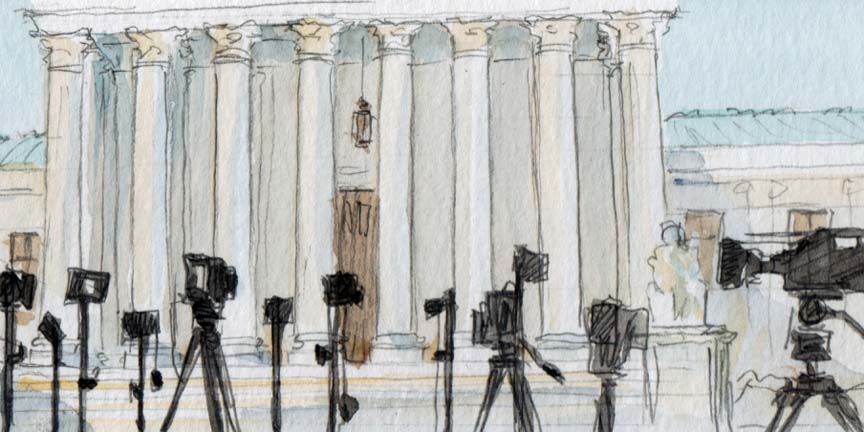Relist Watch Select


John Elwood reviews Monday’s relists … barely
Past predictions of explosive growth in the relist numbers are coming true as we have seven new relists this week. But because I’m stretched too thin to offer much in the way of description and analysis, it’s time once again for the affordable luxury of Relist Watch SelectTM. This week’s new relists involve First Amendment limitations on President Donald Trump’s ability to block people on Twitter, the criminal conviction of former New York state assembly speaker Sheldon Silver, voter ID requirements, the Fair Labor Standards Act, and the limits of the presumption of class-wide reliance in securities class actions recognized in Basic Inc. v. Levinson.
Each case is interesting enough to warrant more discussion, but in my limited time available let me simply note that that the Trump Twitter case was originally scheduled to go to conference just before the presidential election, but the court rescheduled it four times beginning in late October — probably so they could see whether the issue has continuing importance. We should have more clarity by Monday.
New Relists
Silver v. United States, 20-60
Issues: Whether a public official can be convicted of bribery absent proof of an agreed exchange with the alleged bribe payor, based solely on his unexpressed, unilateral state of mind when receiving a benefit; (2) whether a conviction for Hobbs Act extortion can be based on a theory of simple bribery; and (3) whether, if the government elects not to argue harmless error, a court of appeals may raise harmless error sua sponte, without providing the defendant any opportunity to be heard on the issue.
(relisted after the Dec. 4 conference)
Kane County, Utah v. United States, 20-82
Issues: (1) Whether Rule 24(a)(2) of the Federal Rules of Civil Procedure allows intervention as of right where the movant does not have a significant, cognizable interest in the lawsuit; and (2) whether the United States adequately represents its title, which is the only interest at issue in a quiet title suit.
(relisted after the Dec. 4 conference)
United States v. Kane County, Utah, 20-96
Issue: Whether an advocacy organization’s environmental concerns qualify as an “interest” required by Rule 24(a)(2) of the Federal Rules of Civil Procedure for the organization to intervene as of right as a party defendant in a pending civil action, where no judicial relief could be granted against that organization in the action and its environmental concerns are unrelated to any claim or defense that the organization could itself assert in the action.
(relisted after the Dec. 4 conference)
Schwab v. Fish, 20-109
Issues: (1) Whether the Constitution prohibits Kansas from requiring applicants to provide proof of U.S. citizenship when registering to vote; and (2) whether Section 5 of the National Voter Registration Act of 1993 prohibits Kansas from requiring motor-voter applicants to provide proof of citizenship when registering to vote.
(relisted after the Dec. 4 conference)
Trump v. Knight First Amendment Institute, 20-197
Issue: Whether the First Amendment deprives a government official of his right to control his personal Twitter account by blocking third-party accounts if he uses that personal account in part to announce official actions and policies.
(relisted after the Dec. 4 conference)
Goldman Sachs Group, Inc. v. Arkansas Teacher Retirement System, 20-222
Issues: (1) Whether a defendant in a securities class action may rebut the presumption of classwide reliance recognized in Basic Inc. v. Levinson by pointing to the generic nature of the alleged misstatements in showing that the statements had no impact on the price of the security, even though that evidence is also relevant to the substantive element of materiality; and (2) whether a defendant seeking to rebut the Basic presumption has only a burden of production or also the ultimate burden of persuasion.
(relisted after the Dec. 4 conference)
Chipotle Mexican Grill, 20-257
Issue: Whether a district court may consider factors other than the presence of a single material question of law or fact common to a group of employees when assessing whether the employees are “similarly situated” for purposes of the collective-action provision of the Fair Labor Standards Act.
(relisted after the Dec. 4 conference)
Returning Relists
Shinn v. Kayer, 19-1302
Issue: Whether the U.S. Court of Appeals for the 9th Circuit violated 28 U.S.C. § 2254‘s deferential standard, and employed a flawed methodology that the Supreme Court has repeatedly condemned, when it granted habeas relief based on a de novo finding that a Sixth Amendment violation had occurred.
(relisted after the Sept. 29, Oct. 9, Oct. 16, Oct. 30, Nov. 6, Nov. 13, Nov. 20 and Dec. 4 conferences; record requested before the Oct. 15 conference and received Oct. 28)
Posted in Cases in the Pipeline
Cases: Shinn v. Kayer, Schwab v. Fish, Biden v. Knight First Amendment Institute, Goldman Sachs Group Inc. v. Arkansas Teacher Retirement System, Chipotle Mexican Grill Inc. v. Scott, Silver v. United States, Kane County, Utah v. United States, United States v. Kane County, Utah
